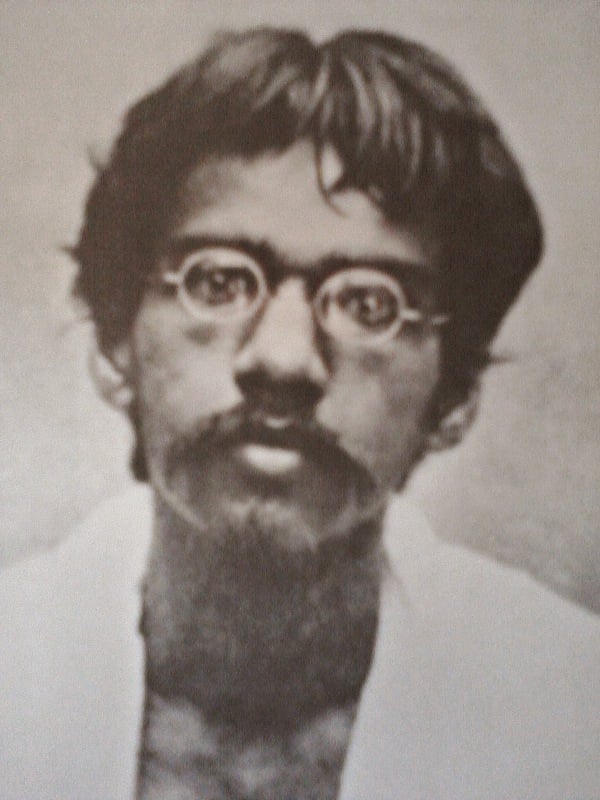PERSONAL INFORMATION
Other name: Barin Ghosh [1] The Statesman
Profession(s): Revolutionary and Journalist
Known for: Being one of the founding members of ‘Jugantar’ a Bengali weekly during the freedom struggle movements in India under the British Raj.
Date of Birth: 5 January 1880 (Monday)
Birthplace: Upper Norwood, London, England
Age (at the time of death): 79 Years
Zodiac sign: Capricorn
Nationality: Indian
Age: 79 Years
Check Out Other Celebrities Biography
- saira banu a r rahmans ex wife biography
- gautam adani biography
- niveditha gowda biography
- minal khan pakistani actress biography
- jr ntr biography
EDUCATION
Educational Qualification(s): • Initial school education at Deoghar, a city in Jharkhand. • In 1901, he joined Patna College. [3] Amrit Mahotsav
PHYSICAL STATISTICS
Eye Colour: Black
Hair Colour: Black
FAMILY & RELATIONSHIPS
Marital Status (at the time of death): Married
Wife/Spouse: Sailaja Dutta (widow of a respectable family)
Parents: Father – Dr. Krishnadhan Ghosh (physician and district surgeon) Mother – Swarnalata
Siblings: Brothers – 3 • Sri Aurobindo (Indian philosopher, yoga guru, maharishi, poet, and Indian nationalist) • Manmohan Ghose (Indian poet) • Benoy Bhushan Sister – Sarojini Ghosh
Mother: Swarnalata
Father: Dr. Krishnadhan Ghosh
OTHER INFORMATION
Date of Death: 18 April 1959
Place of Death: Kolkata, India
Death Cause: Life Imprisonment at Andaman Cellular jail [2] The Statesman
INTERESTING BACKGROUND INFORMATION
Barindra Kumar Ghosh was an influential figure in the Indian freedom struggle, renowned not only for his revolutionary endeavors but also for his work as a journalist. As a founding member of the Bengali weekly ‘Jugantar,’ he played a pivotal role in shaping the discourse around Indian nationalism. Born into a family steeped in intellectual and reformist traditions, Barindra was the younger brother of the eminent philosopher and yoga guru, Sri Aurobindo. His maternal grandfather, Rajnarayan Basu, was a notable social reformer and a follower of the Brahmo religion, further emphasizing the rich intellectual legacy that surrounded him.
The early years of Barindra Kumar Ghosh’s life were marked by significant changes, particularly when, at the end of 1878, his father, Dr. Krishnadhan Ghosh, took his wife and children to England for medical treatment during her pregnancy. This journey aimed to provide an entirely European upbringing for his sons, as Dr. Ghosh believed it would foster better opportunities for their future. Upon reaching England in January 1879, Dr. Ghosh left his children in the care of an English clergyman while he returned to India in 1880, intending to resume his medical practice. Unfortunately, the family’s dynamics shifted again with the return of Barindra’s mother, Swarnalata, that same year.
Tragedy struck in 1893 when Dr. Ghosh passed away, leading Barindra and his sister to be taken in by their maternal uncle, Jogindranath. In Deoghar, Barindra found inspiration in the patriotic lectures of his Bengali teacher, Sakharam Ganesh Deuskar. This period marked a turning point, as he began learning about the revolutionary exploits of his elder brother, Sri Aurobindo, and reconnected with his second brother, Manmohan Ghosh, a notable scholar and professor. Barindra’s educational journey continued, and by 1901, he successfully passed the entrance examination for Patna College, where he briefly resided with Manmohan before establishing himself in Kolkata.
In the years that followed, Barindra Kumar Ghosh became increasingly involved in revolutionary activities, forming alliances with key figures such as Jatindranath Banerjee. In 1906, he established the publishing house ‘Jugantar,’ which quickly evolved into a front for revolutionary activities against British colonial rule. Alongside his responsibilities in Jugantar, Barindra also received formal military training in Baroda, preparing him for the significant role he would play in the freedom movement. His dedication to the cause led to his arrest in 1908, following the attempted assassination of a British magistrate, an event that intensified British crackdowns on Indian rebels. Initially sentenced to death, Barindra’s punishment was later commuted to life imprisonment in the infamous Cellular Jail in the Andaman Islands, where he remained until amnesty was granted in 1920.
Upon returning to Kolkata, Barindra Kumar Ghosh resumed his work in journalism and took to writing, producing memoirs that reflected on his time in exile. His literary contributions, including ‘The Tale of My Exile’ and a variety of other works, solidified his reputation not only as a revolutionary but also as a respected author. Over the years, he moved towards spiritualism, particularly under the influence of his brother Sri Aurobindo, and eventually returned to Kolkata where he continued to engage in journalism, founding ‘The Dawn of India’ in 1933, and later serving as the editor of ‘Dainik Basumati’ in 1950. Barindra Kumar Ghosh’s life journey is a testament to his multifaceted contributions to Indian society, intertwining his revolutionary spirit with a profound commitment to literature and journalistic integrity.
—
Note: All biographical information compiled from publicly available sources.
